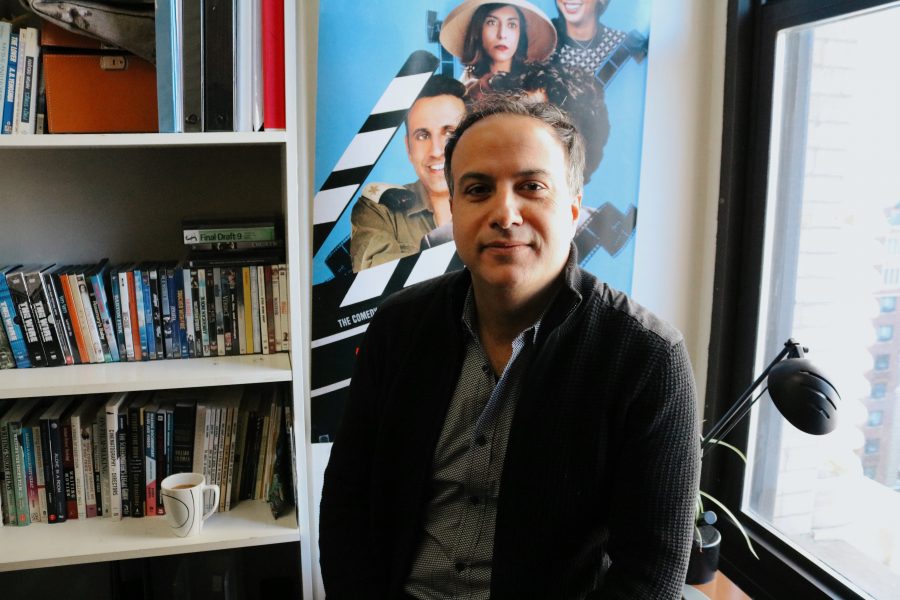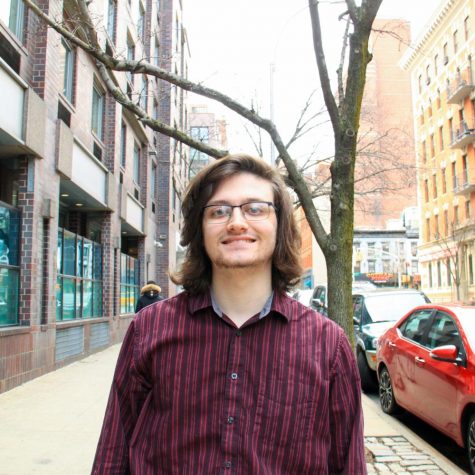Professor Sameh Zoabi has had to explain who he is since the day he was born.
Born in a Palestinian village outside of Nazareth, Israel, Zoabi is a man stuck in the middle. When Israeli tanks rolled through Palestine in 1948, most Palestinians fled or were expelled to the West Bank, Gaza or the greater Arab world, but Zoabi’s family were among those who stayed behind. Though he is Palestinian, he holds Israeli citizenship. A minority in Israel and a foreigner to the State of Palestine, Zoabi says his family has simply remained in their home.
Many Palestinians in the Gaza Strip and the West Bank are affected by the occupation daily. Deaths resulting from the conflict with Israel are a constant news fixture. Earlier this year Israeli Prime Minister Benjamin Netanyahu vowed to annex the West Bank, threatening the very integrity of a Palestinian state.
“I’m not coming from a place of privilege,” Zoabi told WSN. “My mom is a refugee.”
As a boy, Zoabi’s exposure to film was minimal. With only two Arabic-language channels to choose from, his family would watch old Westerns, Egyptian soap operas and plays featuring superstar Adel Emam — who has graced Egypt’s silver screen since 1964 — broadcast by Israeli networks over and over. One such program, “Ra’fat Al Haggan” (1988-1991), is about Egyptian spy Refaat Al-Gammal, whose efforts were instrumental to Egypt’s successes in the 1973 October War. It is also the basis for the eponymous soap opera, about a Palestinian spy who seduces an Israeli general, within Zoabi’s recent film, “Tel Aviv on Fire.”
Zoabi recalls being star struck as a six-year-old by his older sisters’ cutouts of James Bond performer Roger Moore, Egyptian singer and actor Abdel Halim Hafez and Spanish singer Julio Iglesias. He wanted to be a part of that world of stars and artists. Following the dawn of VHS in his teenage years, Zoabi and his friends would watch Chuck Norris and “Rambo” action flicks because they found the actresses on the covers attractive. A straight-A student with a penchant for cracking jokes, Zoabi saw formal education as a way to express his sense of humor through filmmaking.
Zoabi and his brother were the only ones out of nine children in their family to go on to higher education. Zoabi attended Tel Aviv University because it was the only school in Israel that offered a degree in film, though he also majored in English literature, planning to become an English teacher if his artistic aspirations didn’t pan out.
One of two Arab students in the entire program, Zoabi says he felt pressured to tell stories that confirmed biases about the Arab community in Israel. He rejected what he called an orientalist approach, wherein his films were somehow expected to perpetuate erroneous narratives.
When Zoabi came to the U.S. to attend Columbia University on a Fulbright scholarship for his MFA, things didn’t become any easier. Because his application said Israel, professors were surprised to see that he was Palestinian, and he had to constantly re-explain his identity.
In “Tel Aviv on Fire,” Salam (Kais Nashef) is a Palestinian living in East Jerusalem who is promoted from production assistant to writer on his uncle’s show. The eponymous fictional soap opera is produced in the West Bank city of Ramallah. Through the film, Zoabi seeks to tell an authentic version of his own story as a Palestinian citizen of Israel.
As Palestine is unable to provide national funds for filmmakers, Zoabi notes that the Palestinian narrative is often told via individuals. In the film, he tells his own, as Salam tangoes with Palestinian producers who want to see the spy in the show complete her PLO mission and an entitled IDF checkpoint guard who wants her to defect and find true love with the Israeli general, struggling to tell the story he wants to. Zoabi’s real-life struggle with Israeli producers throughout the production of the film who feared he would become “too Palestinian” is mirrored in the balancing act of the film.
“Tel Aviv on Fire” is a Luxembourg-Israel-France-Belgium coproduction. As Zoabi is an Israeli citizen, Zoabi could not submit his film as Palestinian. He chose to submit the film as Luxembourgish instead of Israeli because he doesn’t feel he can represent a country that doesn’t always represent him.
In 2013, Indian-American director Mira Nair chose to boycott Haifa International Film Festival, citing what she called the apartheid state in Israel. Zoabi refused to boycott the festival, though he was asked to by associates in the industry, because he said his conduct will determine the accessibility of other Palestinians to Israeli funding to tell their stories. At Haifa, Zoabi and “Tel Aviv on Fire” won Best Screenplay and Best Film respectively.
“I’m not saying it’s an easy choice to take money or not, but at the end of the day … it’s a dilemma for any filmmaker. Doesn’t have to be Palestinian or Israeli or Arab – when someone gives you the money, do you want to sell out your principles and tell any story just to please the funder?” Zoabi said.
“Tel Aviv on Fire” is a comedy, a definite change of pace in the catalogue of Palestinian and Israeli filmmaking concerning the conflict. But comedy is as true-to-life as Zoabi can be. Checkpoints, death and destruction: Zoabi and his friends and family approach them all with a sense of humor.
Zoabi says he follows the path of Billy Wilder, Ernst Lubitsch and Charlie Chaplin, who all countered the rising fascism, pervasive poverty and rapid industrialisation of the era with a laugh.
“I’m not saying it’s the only way […] it’s authentic to me; it’s authentic to my experience; it’s authentic to my voice,” Zoabi said. “It’s easiest for me to write comedy, my films tend to be uplifting because I’m optimistic. Your films can’t not be a reflection of how you see the world in many ways.”
In writing the script, Zoabi was conscious of the fact that he would be coproducing with European producers. Much of the film takes place in the Ramallah studio, nearly all of which is filmed on a set in Luxembourg. However, for the IDF checkpoint Zoabi’s crew constructed a facsimile in Israel. It was the largest checkpoint ever constructed for a film. European activists protested what they believed to be a checkpoint in earnest.
“I love these moments because […] you know that the film is relevant. But it was sad for me in the moment when I saw the checkpoint being built […] in the design of it you start thinking […] [about] the psychology of building something that is so humiliating. It was a very emotional moment actually because it’s sad that you know the feeling to go through this kind of experience,” Zoabi said.
Eleven or so checkpoints dot the border between the States of Israel and Palestine. This does not include the more than 500 roadblocks that bar Palestinians from crossing into Israel. Those hoping to move through the checkpoints daily are subject to callous guards and temporary permits that place arbitrary constraints on their freedom to travel.
For his next project, Zoabi plans to set his comedic stylings against the backdrop of the Blockade of the Gaza Strip.
In 2007, the Israeli government instigated a total blockade of the Gaza Strip that closed its borders, strangled imports and cut power. The blockade was partially eased in 2010, but it officially remains in place to this day.
“We know that it’s miserable […] if you don’t have a punchline at the end of that story nobody wants to hear it,” Zoabi said.
The difference, though, is that “Tel Aviv on Fire” draws on an experience that Zoabi himself has lived. To bring comedy to the Gaza Strip, from which he is removed, is a different ambition altogether.
Zoabi matriculated to Columbia Univeristy in 2005 in the wake of the 9/11 terrorist attacks and the Second Intifada. Zoabi said nobody wanted to hear a Palestinian voice, and he hit a wall in attempting to secure funding for his thesis film “Be Quiet,” about a Palestinian father and son passing through Israeli checkpoints. After three fruitless years of searching for funding in the U.S., Zoabi finally found success in Europe. But times have changed, people watch “Tel Aviv on Fire” and they laugh.
“If you’re telling a story […] that voice that called you to make that story from the beginning has to always be clear for you. I always say there’s no threat to anyone’s voice because your voice is unique,” Zoabi said. “I think we also have to work as a community to understand that we need the different perspectives, different views.”
Zoabi believes that the cultural moment has whetted people’s appetite for the Palestinian story. His own is but one of many Palestinian experiences that need to be heard in order to build a fuller Palestinian narrative in the film industry and the public eye writ large.
To Palestinian, Arab and other marginalized creators, Zoabi hopes his success will serve as a beacon. He encourages unheard voices to find one another and create a community to fund each other’s work.
“Filmmaking is a process that takes a lot of patience and determination and because of where we come from it tends to be even harder. You have to believe in what you’re doing and keep going, because eventually you’ll find a crack through that wall to make [it],” Zoabi said.
A version of this article appears in the Monday, Dec. 2, 2019, print edition. Email Fareid El Gafy at [email protected].
























































































































































